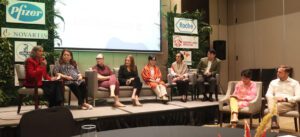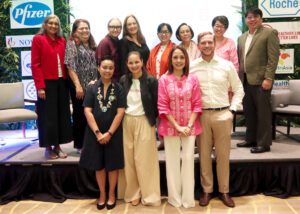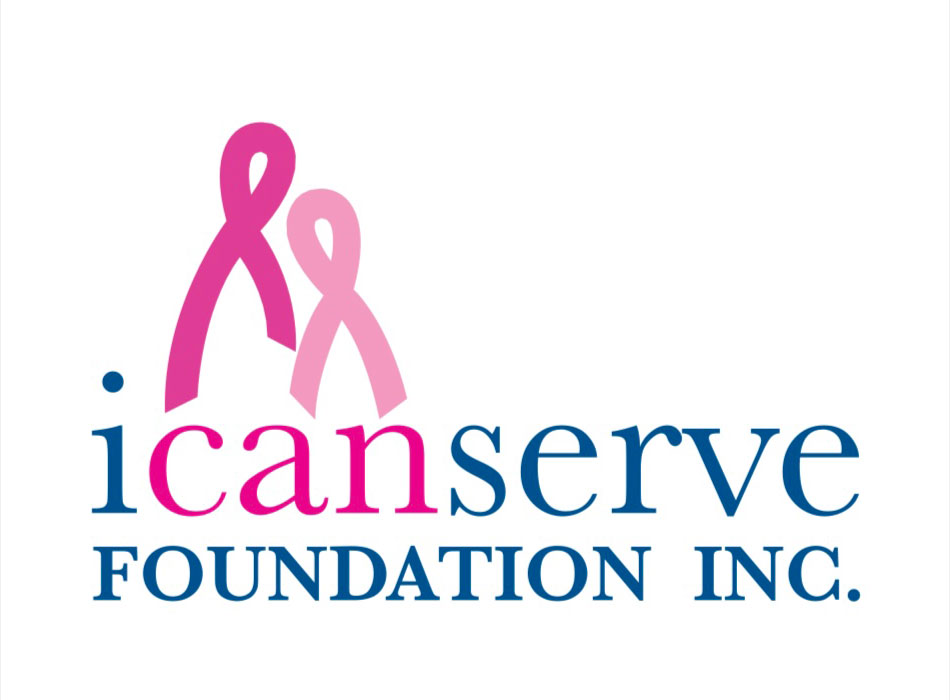The 6th Southeast Asia Breast Cancer Symposium (SEABCS), held from September 23-25, 2022 in Taguig City, Philippines and online, concluded with participants committing to forge partnerships to move the needle in breast cancer healthcare.
At a session on the last day, September 25, called “Louder Together: Calling All ASEAN Voices”, participants from Indonesia, Malaysia, Myanmar, the Philippines, Vietnam and Thailand brainstormed on ways patient advocates can help one another to reduce breast cancer incidence, increase access to lifesaving medicines, and improve data collection to establish measurable objectives and objectively evaluate impact.

From left: Moderator Ranjit Kaur, board member of Reach to Recovery International and of ABC Global Alliance; Carmen Auste of the Philippines, chief executive officer (CEO) of Cancer Warriors Foundation; Carolyn Taylor, founder and president of SEABCS co-host Global Focus on Cancer (GFC); Dr. Anna Cabanes, senior advisor at GFC; Prof. Yin Yin Htun of Myanmar, founder and chairperson of Shwe Yaung Hnin Si (Golden Rose) Cancer Foundation; Budiastuti Wening, vice chairperson of Indonesian Breast Cancer Foundation; Reactors Dr. Ramy Roxas, medical director of Healthway Cancer Care Center; Dr. Madelaine Valera, technical consultant; and Lorenzo Boffi of Union for International Cancer Control. Not in photo is Finola Chatamra of Thailand, senior adviser of Queen Sirikit Centre for Breast Cancer (QSCBC), who joined the discussion via Zoom.
Moderator Ranjit Kaur, board member of Reach to Recovery International and of ABC Global Alliance, mentioned health literacy, rights to clinical trials, and patient safety, among other issues that present opportunities for collaboration as a regional community.
Carmen Auste of the Philippines, chief executive officer (CEO) of Cancer Warriors Foundation, proposed to use frameworks developed by World Health Organization regional offices for certain cancers, and which her group had successfully used for childhood cancer. “But there is none for breast cancer, and we should follow through,” she said.
Azrul Mohd Khalib of Malaysia, founder and CEO of Galen Centre for Health and Social Policy, cited the success of pooled procurement for HIV and COVID-19 vaccines. “There’s been a lot of discussion about regional procurement of cancer drugs, especially high-cost innovative drugs. This is felt more in the LMIC (low- and middle-income countries) settings where the price of drugs is more than the annual household income. This is at the intersection of economics, politics, and ethics. Pool procurement is not new. Its benefits include contained cost, efficiency of procurement cost and delivery,” he said.
Finola Chatamra of Thailand, senior adviser of Queen Sirikit Centre for Breast Cancer (QSCBC), joined the conversation via Zoom and shared their collaboration with Bhutan. QSCBC funded the training of six medical personnel in the fields of breast surgery and radiation oncology. The trainees have been in Thailand since January this year. QSCBC will also donate a tomosynthesis (‘3D’ mammography) machine to Bhutan and train someone to maintain it.
Budiastuti Wening, vice chairperson of Indonesian Breast Cancer Foundation, acknowledged the challenge of obtaining accurate data on breast cancer cases from hospitals. Prof. Yin Yin Htun of Myanmar, founder and chairperson of Shwe Yaung Hnin Si (Golden Rose) Cancer Foundation, broached the idea of forming a coalition or alliance to draw in more stakeholders that can close the gaps in breast cancer healthcare.
The session closed with an agreement to continue the conversation.

Back row from left: Ranjit Kaur (Malaysia), Carmen Auste (Philippines), Carolyn Taylor and Dr. Anna Cabanes (Global Focus on Cancer); Prof. Yin Yin Htun (Myanmar), Budiastuti Wening, (Indonesia), Dr. Madeleine Valera (Philippines), Dr. Ramy Roxas (Healthway Cancer Care Center); front row from left: Nikoy de Guzman, Crisann Celdran and Kara Magsanoc-Alikpala (ICANSERVE) and Lorenzo Boffi (Union for International Cancer Control). Finola Chatamra (Thailand), who joined the discussion via Zoom
Hosted by ICANSERVE Foundation and Global Focus on Cancer, and supported by the American Society of Clinical Oncology and the Union for International Cancer Control, SEABCS 2022 had close to 2,200 registrants from 24 countries, gathering doctors, caregivers, patient advocates and cancer survivors from Southeast Asia and beyond.
The next SEABCS will be held in Vietnam in 2023.
